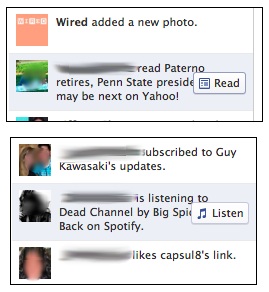We Are Social Asia Tuesday TuneUp #3
Chinese location-based app Jiepang, partners with Starbucks
Jiepang users who visit one of the 200+ Starbucks outlets across Shanghai and Eastern China can now check in with near-field communication-enabled mobile devices. If 20,000 users check in by 17th December, each of those patrons will receive a free size upgrade on a drink during the following week.

With nearly 1.5 million users and over 300 brand partnerships in China since its launch in May 2010, Jiepang is a location-based app to watch.
Coca-Cola ‘gamifies’ vending machines in Japan
As part of its Happiness campaign, Coca-Cola is encouraging Japanese consumers to ‘check-in’ and interact with its 820,000 vending machines across Japan via QR codes affixed to the machines. As part of the ‘Happiness Quest’, users can create virtual identities for, and customise their favourite vending machines, as well as earn badges. Will the Japanese take to this quirky campaign?
Sina Weibo has over 2 million users in Hong Kong
More than one in four Hong Kong citizens now use Sina Weibo, prompting more than 1,000 brands in the city to set up enterprise accounts on the microblogging platform. Considering that Internet users in the SAR have access to international platforms like Facebook and Twitter (in contrast to their mainland counterparts), Sina Weibo’s growth of over 1 million users since March is doubly impressive.
Korea’s Cyworld goes global (again)
Korean social network Cyworld will once again attempt to enter the international market, with the launch of Global Cyworld. This new international version of its service will include content in English, Chinese, German, Japanese and Spanish, in addition to Korean, and allow users around the world to connect with one another (a feature that was previously unavailable). Let’s see whether Cyworld will succeed this time around.
US guidelines on Facebook ‘Like-gating’
Facebook’s ad revenue is projected to hit $7 billion in 2012, but this figure might be hit by the recent guidelines put in place by the Better Business Bureau’s National Advertising Division (NAD). Marketers need to be careful when requesting users ‘Like’ a page in order to receive some sort of reward in order to ensure they are not utilising “misleading or artificial means to inflate the number of Facebook ‘likes’.”
This move has come about after a case was made against eyewear supplier Coastal Contacts for deceptively offering free and discounted products to Facebook users who ‘liked’ the company’s page, and that the number of ‘likes’ presented to investors had been fraudulently obtained.
The NAD cannot itself enforce decisions, but it can refer cases to the Federal Trade Commission if a marketer does not comply with one of its decisions.
New European guidelines on paid for promotion in social media
Meanwhile, in the UK, the IAB and ISBA jointly released guidelines on the payment for editorial content to specifically promote a brand, product or service within social media, which have been developed in consultation with both the Office of Fair Trading and the ASA’s Committee for Advertising Practice.
Facebook gives up on China (for now)
It might have the most faces out of any country in the world, but China will still not have Facebook for a while yet. In an interview with Charlie Rose, Sandberg revealed how government policies were the main reason why expansion into China was not yet possible for Facebook; “it’s not really our choice. It’s the government’s choice, you know. We’re not available because they’ve chosen to make us not available.”
CheWen is Renren’s niche social network for car fanatics
China’s CheWen.com is a social network for car lovers, and has already amassed a user base of 4 million in the span of six months. It encompasses functions of a microblog in being able to ‘follow’ users and brands, has crowdsourcing elements similar to Quora, and also provides automotive news. In particular, the potential for advertisers to reach wealthy netizens is significant, even though the social network is mostly free of ads at the moment.
Read and Listen from the Ticker
Another Facebook baby birthed at f8, the Ticker has undergone a few changes recently. Now news articles and songs in the Ticker include buttons that allow users to begin reading or listening as soon as they click on them.

Facebook also announced their decision to turn off automatic RSS feed syndication within Facebook Notes from 22 November.
Small, mid-sized music businesses have greatest Facebook reach
Social marketing platform Roost set out to understand how small and mid-sized businesses (SMBs) can use Facebook effectively, and determined that businesses operating in music, entertainment and luxury goods have the highest reach (number of fans). Interestingly enough, SMBs in the music industry have the third lowest activity level amongst 28 industries, even though they have the greatest social audience. On the flipside, SMBs in the medical industry have the lowest reach, but are generally the most active in their Facebook efforts.
LinkedIn announce Group Statistics and improve Events
Taking a leaf out of Facebook’s success with Insights, LinkedIn have launched statistics for Groups through an easy-to-use dashboard, focusing on three areas: demographics, growth, and activity.
In the past year there have been over a million RSVPs to hundreds of thousands of professional events on LinkedIn. LinkedIn are now taking Events a step further, making it easier to find the right events to attend and connect with others attending those events.
Budweiser’s Man of the Match to be picked by fans
It’s never been done before, as the decision of who will be the Budweiser Man of the Match has always been reserved for broadcast commentating teams. But now Budweiser are handing over responsibility to their fans, and for every FA cup game this season the Budweiser Man of the Match will be chosen by fans via the Budweiser UK Facebook page or through the free Budweiser Man of the Match app for smartphones. Knowing how football fans love a joke, this may lead to some interesting results…
When a bird leaves the nest, can it take the flock with it?
As a court picks over PhoneDog’s complaint that one of its former journalists, Noah Kravitz, failed to surrender the password and thus the fans to a Twitter account originally tied to the company name, it’s left everyone debating the rights to digital possessions. In an era where journalists are encouraged to brand themselves, this type of dispute is becoming more frequent. Is leaving a job becoming more like a social media divorce?

Buzzword alert! The proliferation of ‘social television’
From X Factor to Glee, TV programmes are utilising social networks to improve engagement with and among fans. Studies have discovered that up to 80% of television viewers now incorporate a ‘second screen’ into their viewing habits, and apps such as Zeebox – of which Channel 4 have become the first broadcaster to trial – are facilitating this new intersected experience. Media analysts believe that this development will continue to grow. Why? As our very own Robin Grant points out, stories are social:
We’ve moved on from a temporary aberration where, through the invention of the printing press all the way through to the invention of TV, communication became one-way for a few hundred years. That’s not the natural human state. Social media has brought us all back around the campfire and allowed us to talk to each other and to take part in the stories people are telling.
Branded hangouts on Google+
With brand pages recently enabled on Google +, it will be interesting to see how brands make use of the social network for marketing purposes. UK Opticians Specsavers are staking a claim to the first celebrity ‘hangout’ on the platform, with fashion bloggers invited to video chat with brand ambassador Gok Wan. The event will be integrated with other social sites – Specsavers’ YouTube channel will broadcast the event and Facebook will have corresponding live status updates.
Two-thirds of Brits support silencing social media during social unrest
A poll has revealed that two-thirds of UK adults believe that shutting down social networks such as Twitter and BlackBerry Messenger during times of social unrest would help prevent it spreading and worsening. Unsurprisingly, support for action against social networks was strongest among over-65s and weakest among 18 to 24-year-olds, who are the heaviest users of these services.
But as news editor of Index of Censorship, Padraig Reidy, argues:
It’s very worrying that people would believe shutting down social networks would be in any way desirable. The vast majority of social network use during the unrest was people spreading information and helping each other get home safely.